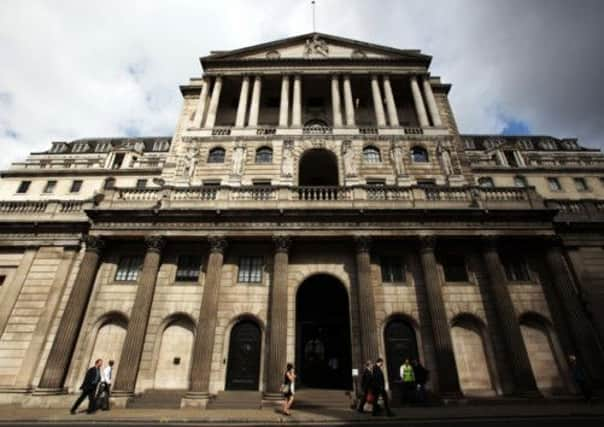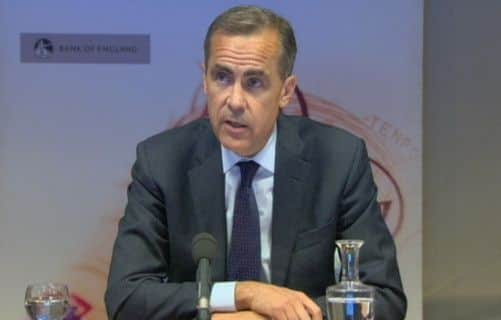Bank of England to keep interest rates low


In his first major announcement in the post, Mark Carney said a economic recovery in the UK “is now under way”, but acknowledged it “remains weak by historic standards.”
Mr Carney’s intervention is the first of the much-heralded “forward guidance” from the Canadian aimed at creating greater stability in the economy.
Advertisement
Hide AdAdvertisement
Hide AdHe said that interest rates will not rise again from 0.5 per cent until unemployment has fallen below 7 per cent. By the Bank’s calculations, that will require the creation of another 750,000 jobs and is unlikely to happen for at least another three years.


The move will provide a shot in the arm to the housing market and is good news for borrowers and potential house buyers, but is likely to prove unpopular with savers and pensioners.
The strategy is designed to avoid fears that rates would jump after positive economic news and brings the Bank of England (BoE) in line with the US Federal Reserve and the European Central Bank.
It also mirrors the steps Mr Carney took when he headed the central bank in Canada – one of the few countries to avoid the worst of the global recession.
His success in that role was one of the reasons he was head-hunted for the top job at the BoE.
Employment levels are seen as a key indicator of the economy’s health. It is believed that if more people are economically active and contributing to the economy, the country can cope better with higher interest rates without spiralling into recession.
The announcement was welcomed across the political spectrum yesterday, although there was disagreement over whether the move was the result of good or bad economic policy on the part of the coalition government.
Mr Carney said: “A renewed recovery is under way in the United Kingdom and appears to be broadening.
Advertisement
Hide AdAdvertisement
Hide Ad“[But] the legacy of the financial crisis means that the recovery remains weak by historical standards.”
The Bank pledged not to scale back its £375 billion economy-boosting programme of quantitative easing (QE) while unemployment remains above the threshold – and could increase asset purchases if the economy suffers a relapse.
Mr Carney said higher employment and incomes would “represent real improvements in the lives of people across the nation”.
Around 2.51 million Britons are unemployed, giving a jobless rate of 7.8 per cent. Although the Scottish unemployment rate is lower – 7.5 per cent – the BoE will react only to the UK-wide figure.
Cutting the UK figure to 7 per cent would mean “well over three-quarters of a million new jobs” are created, Mr Carney said.
But the forward guidance came with a number of caveats – or “knockouts” – that could see the Bank take action on rates before unemployment falls to below 7 per cent, including if policy-makers fear inflation will be 2.5 per cent or higher in 18 months’ to two years’ time.
The guidance was welcomed as good news for borrowers and potential house buyers, Paul Smith, chief executive of estate agency Haart, said Mr Carney’s guidance was “the biggest boost that the property market has seen in a long time”, allowing lenders to offer attractive rates to those seeking a mortgage and lock those rates in for longer.
“The Governor’s statement gives a stability to the market which is vital for its growth and increased activity.
Advertisement
Hide AdAdvertisement
Hide Ad“Significant increases in property prices reported over the last few days ought to spur prospective buyers to put their property on the market at a relatively early stage to benefit from this positive sentiment.”
Business leaders also welcomed the Bank’s new stance, saying it would allow firms to plan ahead, borrow and invest with more certainty.
However, by keeping the price of UK government bonds low, the bank’s policy is bad news for pensioners.
Pensions experts and campaigner Dr Ros Altmann said: “Anyone approaching retirement and potentially buying an annuity, anyone running a pension scheme and anyone saving for their future will have been disappointed by today’s masterly statement from Mark Carney, potentially promising three more years of emergency, ultra-low, interest rates.
“With an ageing population we need to encourage saving so that people have money for their future, but this policy environment undermines incentives to save. It may suit borrowers short-term but is has dangerous longer term consequences.”
Mr Carney’s announcement was welcomed by Conservative Chancellor George Osborne as an endorsement of the government’s austerity strategy.
He said: “For hard-working families thinking of taking out a mortgage or a business, thinking about expanding and taking out a loan to expand, they’re going to have greater certainty that interest rates are going to stay low for longer.
“And that is part of our economic plan: to move this country from economic rescue to economic recovery, and so I think it’s very welcome news.”
Advertisement
Hide AdAdvertisement
Hide AdIn a rare sign of political unity, Mr Carney’s approach was also supported by the coalition’s critics.
Trades Union Congress (TUC) general secretary Frances O’Grady hailed the new policy. “This announcement shows that the Bank understands a real recovery is something that benefits ordinary people, and not just an upward blip in economists’ outlooks,” she said.
Shadow chancellor Ed Balls said: “Mark Carney is right to warn that the recovery is weak. It is the slowest on record and families are facing a growing cost-of-living crisis.”
SNP Westminster Treasury spokesperson Stewart Hosie MP said: “I welcome the Governor’s comments – it would be madness to see any rise in interest rates until recovery is secure and at the moment we are far from it.”
Role or rates
Interest rates are important economic levers because they dictate wealth and growth.
Low interest rates mean that borrowing is cheap and in theory stimulates the housing market by allowing people to take out less onerous mortgages.
They also mean that businesses can borrow for less. This means that, historically, interest rates have been kept down when the government wants to create an economic boom.
However, low interest rates are bad news for people with savings or those who live off investments because it means that the value of their assets grows at a much slower rate.
Advertisement
Hide AdAdvertisement
Hide AdThe current economic circumstances, however, have suggested that low interest rates are not necessarily the answer.
Because of the banking crash it has been harder generally to get mortgages or business loans.
In addition, loans have been subject to much higher interest rates as banks take a more cautious approach and try to make sure they are not overstretched again.
This has meant that interest rates have not been the panacea they have been in the past.
Q and A
Q What has changed at the Bank of England?
A The Bank’s policy-makers have now spelled out the criteria they need to see before they consider raising interest rates – previously the decision was made on a month-by-month basis.
Q Is this a guarantee that the rate will stay low until 2016?
A No. The Bank will start thinking about raising rates once unemployment falls below 7 per cent, which could happen sooner than expected if the economy continues to improve. There are also several “get-out” clauses relating to inflation.
Q How will this affect mortgage rates?
A Homeowners with a tracker mortgage look set to enjoy very low rates for several more years to come.
Q What about first-time buyers?
Advertisement
Hide AdAdvertisement
Hide AdA First-time buyers and those looking to re-mortgage can now look forward to a choice of attractive fixed-rate deals as lenders can now be confident that the base rate will stay low, but there are fears that by helping buyers the Bank’s policy might push up house prices.
Q Why is this bad for pensioners?
A Low rates usually mean higher inflation – those on a fixed income will see their spending power eroded faster And they also mean lower rates for those seeking an annuity.
Q Will this affect the exchange rate?
A In theory, protracted low rates should weaken the pound and make foreign holidays more expensive.
SEE ALSO